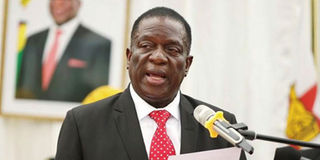Mnangagwa hits back at UK over claims of rights violations in Zimbabwe

Zimbabwean President Emmerson Mnangagwa.
Zimbabwe President Emmerson Mnangagwa has accused the United Kingdom of interfering in his country’s internal affairs after London voiced concerns over human rights violations and persecution of government critics in the southern African country.
In its Human Rights Priority Countries’ ministerial statement for the period January to June 2021 published late last month, the UK’s Foreign, Commonwealth and Development Office said Zimbabwe remained a major source of concern because of the worsening human rights situation.
Tariq Mahmood Ahmad, the UK minister of state for the Foreign Office, also told the House of Lords that London was leaning on Zimbabwe’s neighbours such as South Africa and Botswana to push for a resolution of the crisis.
President Mnangagwa hit back in a televised address on Tuesday, saying the debate in the House of Lords and Lord Ahmad’s statements amounted to “unwarranted and blatant interference in Zimbabwe’s domestic affairs”.
“Only last week, our country Zimbabwe became a subject of unmerited focus and debate in the British House of Lords,” he said.
“In the ensuing debate by that foreign legislative body with no jurisdiction over our country, a junior minister of Her Majesty’s government in charge of Foreign, Commonwealth and Development Office, one Mr Tariq Mahmood, revealed that Her Majesty’s government has been meeting in Harare with various (trade) unions, including teaching unions, most recently in September 2021 on salaries and the impact of Covid-19.”
President Mnangagwa added: “To us, this brazen disclosure was yet another confirmation of very gross, unwarranted and blatant interference in the domestic affairs of our country by the British government, contrary to rules and precepts of the Geneva Conventions, which regulate inter-state relations.”
He said Zimbabwe had been a sovereign state since its independence from Britain in 1980 and since it was not affiliated to the Commonwealth, London had no basis for dictating to it how to run its affairs.
“Equally, civic groups and teachers employed by the Zimbabwe government to work here in Zimbabwe are not employees of the British government, whether by contract or remuneration,” President Mnangagwa said.
“Their activities, singly or in combination, have nothing to do with the British government or any foreign government for that matter.
“Because of this brazen, self-confessed violation of our sovereignty and threat to our national security and stability by the British government, government will institute a full and thorough investigation into this very grave matter.”
The UK says it is concerned about human rights violations in Zimbabwe, which include the targeting of prominent opposition and civil society leaders.
Several critics of President Mnangagwa’s government have been arrested for organising protests or posting critical comments on social media.
The southern African country’s security forces have also ruthlessly put down protests against the government and arrested the leaders.
In February this year, the UK slapped sanctions on four Zimbabwean security chiefs that it said were responsible for some of “Zimbabwe’s worst human rights violations under the Mnangagwa regime”.
President Mnangagwa is accused of going back on his promises to return Zimbabwe into a democracy after taking over power from longtime ruler Robert Mugabe in a 2017 military coup.





